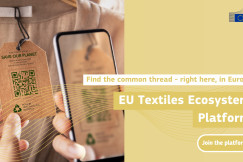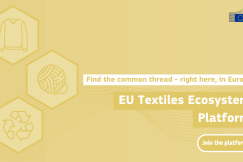Articles
04 April 2025
M4CF Navigating Change report 2024/2025
Articles
04 April 2025
R&I, techniques and technological solutions
Skills
Social dimension
+8 more
Login / create an account to be able to react
-
25

The Monitor for Circular Fashion (M4CF) SDA Bocconi presented the 2024/2025 Report during the event Navigating Change: ESG Roadmaps to Circular Fashion on SDA Bocconi’s Milan campus. Key research results focus on ecodesign, social impact, role of technologies for the twin transition in textiles
SDA Bocconi
Topics
Italy
Academic / Research and VET Institutions
-
Transition Pathway's building blocks
-
-
R&I, techniques and technological solutions
-
Skills
-
Social dimension
-
Sustainable competitiveness
-
Regulation and public governance
-
-
Industrial ecosystems
-
-
Textile
-
-
Textiles ecosystem areas
-
-
Apparel and clothing accessories
-
Leather and fur
-
Footwear
-
Research and Innovation
-
Technology and Machinery
-
Share
The annual event brought together industry experts, partner companies of the M4CF, policymakers, institutional representatives, and numerous key players across the fashion supply chain, from upstream to downstream. During the event, in addition to the presentation of the annual report by the Research Observatory, the M4CF pledge– called Circular Fashion Manifesto - was introduced to institutional players such as the European Commission and UNECE. This pledge represents a formal commitment by partner companies to pursue goals related to circularity, sustainability, traceability, and transparency.
The results of the survey conducted among the M4CF partner companies on the maturity level of ecodesign reveal that most businesses are actively engaged in pilot projects for the implementation of ecodesign principles. These projects include the measurement of specific KPIs and a holistic approach that considers the entire product lifecycle. The most advanced companies ("monitored") at present are those that have begun integrating ecodesign principles within their business processes. To reach the highest level ("optimized"), they still need to activate continuous improvement processes in the development of circular products with performance indicators and the involvement of consumers (e.g., through repair practices, take-back programs...) and other stakeholders (e.g., EPR consortia, recyclers, etc.). With the arrival of the sector-specific delegated act completing the Ecodesign for Sustainable Products Regulation (ESPR), companies will be pushed to move in this direction.
The analysis of research results shows that the implementation of ecodesign strategies, which require initial investments, higher operational costs, and greater complexity, is associated with higher expected benefits. These findings apply to both supply chain actors and service providers. Furthermore, considering the assessment of complexity and relevance, "Designing with renewable materials" and "Designing with non-toxic materials" (compliant with REACH) are the most effective strategies.
The research results also reveal that certain factors help companies achieve a higher level of ecodesign maturity, including the measurement of circularity through specific KPIs. The most relevant ones are mentioned in the research report.
In the SDA Bocconi research survey, M4CF partners were also asked to indicate the most relevant technologies for circularity over the next three years. According to the forecast of the 10 service providers within M4CF, who work with more than 24,000 fashion clients, the key technologies will be those for recycling, traceability, and digital product passports (DPP).
Over the next three years, a 31% increase is expected in the adoption of artificial intelligence to support the circular transition, followed by online platforms for circularity (with a 19% increase) and online platforms for traceability (+12%).
The implementation of the Digital Product Passport (DPP) for textiles will be mandatory for textile products placed in the EU market soon, possibly as early as 2028, to provide consumers with information on characterising the sustainability and circularity of textile products, helping consumers make informed purchasing decisions.
In the next steps of M4CF, which launched its fifth edition on 13 March with the inclusion of new partners, an important discussion with policymakers in Brussels in June 2025 will take place to present the first results from the working groups on ecodesign, social impact, and the role of technologies.
The 2024/2025 Report is available here.
Documents
Comments (0)
See also
-
75
Takeaways from the event ‘Early Peek into the EU Textiles Ecosystem Platform’
- Categories
- Infrastructure Investments and funding R&I, techniques and technological solutions +28 more
-
5
Welcome to the 'Certification and Communication’ Community workspace
- Categories
- Infrastructure Investments and funding R&I, techniques and technological solutions +26 more
-
45
Introducing the ‘Themed Discussion Days’ on the EU Textiles Ecosystem Platform
- Categories
- Infrastructure Investments and funding R&I, techniques and technological solutions +26 more




